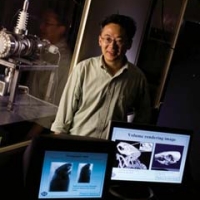PhD
David R. Godschalk Distinguished Professor, Physics and Astronomy
UNC-Chapel Hill
Clinical Research
Area of Interest
We are interested in the application of nanotechnology for cancer detection and therapy. Currently we conduct research in the following specific areas:
1. Dynamic micro-computed tomography for in-vivo small animal imaging
The aim of this project is to develop a dynamic micro-computed tomography (micro-CT) system with enhanced spatial and temporal resolution and more versatile imaging capabilities compared to the current commercial micro-CT scanners, and to explore its applications for biomedical research. The goal is to provide a scanner which will maximize image resolution for in vivo scanning of mice and with the target organ systems being the cardiopulmonary system. The system utilizes a micro-focus field-emission x-ray source recently demonstrated in our laboratory. Compared to the conventional micro-focus x-ray sources with thermionic cathodes, the new carbon nanotube (CNT) based field emission x-ray source offers high resolution at significantly reduced size, fast pulsation capability currently not possible, and the potential for higher flux.
2. New x-ray imaging system for breast tomosynthesis
We are aimed at developing a stationary x-ray imaging system for digital breast tomosynthesis. The main innovative feature of this system is a multi-beam field emission x-ray (MBFEX) source which can generate x-ray beams from multiple projection angles without mechanical motion or electromagnetic steering. The x-ray radiation can have programmable waveform with high temporal and spatial resolution. The proposed imaging system with the MBFEX source and an area digital detector can: (1) increase the imaging speed; (2) reduce the size and cost of the equipement, (3) enable experimentations on new imaging configurations which can give better imaging quality but are not feasible with the convention step-and-shoot method.
3. Single cell irradiator using carbon nanotube field emission electron microbeam array
Single cell irradiation refers to the irradiation by a micron-sized beam to an individually selected cell or a subcellular region in a cell population in vitro. It enables researchers to better explore and study the complex microscopic processes activated by specific cellular or subcellular components of interest following radiation. In collaboration with Prof Chang at Radiation Oncology we are developing a carbon nanotube-based portable microbeam array device can deliver simultaneous irradiation to a very large number of individually selected cells or subcellular regions.
Awards and Honors
- Frost & Sullivan Nanotechnology Innovation Award, 2004
- Lyle Jones Distinguished Professorship, UNC-Chapel Hill, 2003
- Tarheel of the Week, News & Observer, August 2002
- Phillip and Ruth Hettleman Prize for Outstanding Artistic and Scholarly Achievement, 2000
- 100 Most Promising Young Engineers, National Academy of Engineering, 2000

